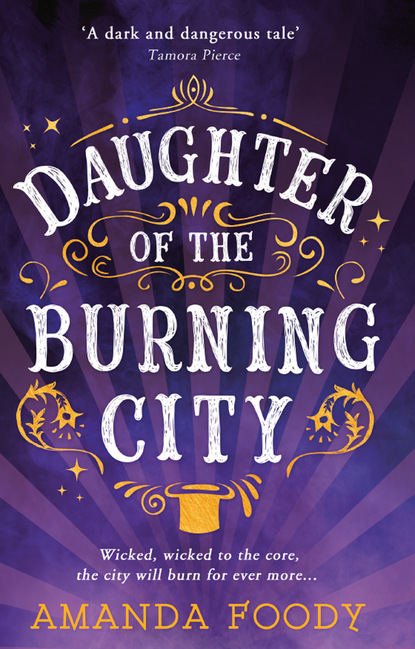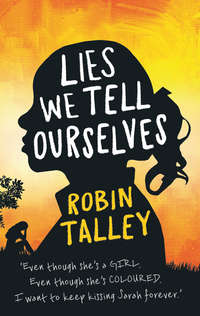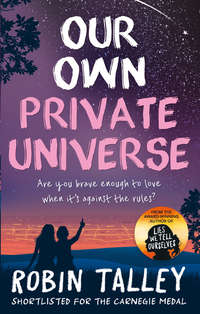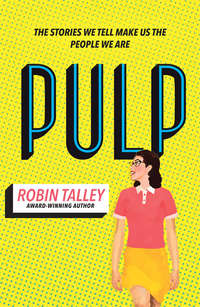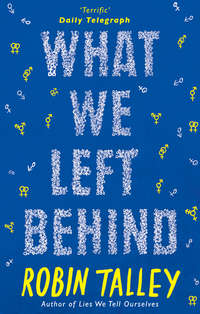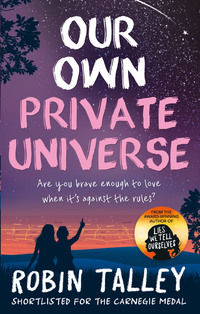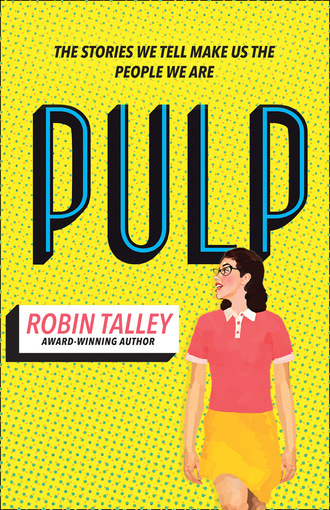
Полная версия
Pulp
“Grandma.” Janet tried in vain to steady herself before she turned. Her grandmother stood in the bathroom doorway, a fresh smile on her wrinkled face. Janet lowered her hand, wishing she were wearing a skirt so she could hide the letter in its folds. “Did you have a nice day?”
“Oh, your father came home for lunch and it was wretched, as always.” Grandma tsked. “When you’re not here to make it interesting, that is. I don’t know why they need you at that restaurant so much of the time.”
“Oh?” Janet racked her brain for a way to slip into her room without her grandmother following.
“Yes, yes. You know your father, always on about something.” Grandma folded her arms, and Janet steeled herself for a rant. “These days he’ll talk about nothing but that new bill. This ridiculous measure by the people who want to blaspheme the Lord’s holy name.”
“The In God We Trust bill?”
“That’s the one. The fools think if we put that on all our money, it’ll keep the Communists from blowing us into the sky. As if any one of those men down in Congress truly understands the first thing about Scripture. Or about Communists, for that matter.”
“Oh, Grandma.” Janet bent down to turn on the fan so it would cover the sound of their voices. The houses on either side of them were separated by no more than a narrow wall of bricks, and conversations carried so easily Janet sometimes felt she knew the neighbors’ problems as well as her own. Dad never liked it when Grandma talked about Communists, but he especially didn’t like it when the neighbors might hear.
Grandma had been a Socialist as a girl. She’d even been arrested once, for demonstrating against the draft during the first World War. She’d wanted to go on living in New York after Grandpa died, but Dad insisted she move in with them, telling the neighbors he wanted to look after her health. When they were alone, though, he said he’d made her leave because Grandma couldn’t be trusted not to walk into the United Nations one morning and tell Churchill himself to go fly a kite.
“Oh, don’t you worry about me, girl.” Grandma laughed as Janet switched on the fan. “Your father may act as though he’s in charge of what I do and don’t say, but trust me, he knows better! Now, enough political talk. You be a helpful child and tell me a happy story about your day.”
Janet tried to think, but her whole focus was on the letter tucked against her leg.
She hated having secrets from her grandmother. When she was younger, Janet had always gone to Grandma with her problems first. She’d poured her heart out to her time and again, sharing all the worries about school and friends that Mom and Dad never seemed to understand. Janet’s parents believed all problems stemmed from rule breaking, and so any troubles she encountered were of her own creation, but Grandma didn’t hold with that philosophy. She always knew exactly what to say to make Janet feel all right again.
This new problem was altogether different from the sort Janet used to bring her, though.
“My friend Marie starts her new job tomorrow,” Janet finally said. “She’ll be a typist at the State Department. A much better job than delivering cheeseburgers, if you ask me.”
Grandma laughed. “One of these days I need to borrow your father’s car and you can bring me one of those burgers. I’m a good tipper.”
Janet laughed. “You don’t have to tip me, Grandma.”
“Well, what if I want to? I’m sure I have a nickel somewhere in these pockets.” Grandma pretended to search her housedress.
Janet laughed again. “Shall I go ahead and heat up the casserole?”
“No, don’t you worry about that on my account. Don’t tell your mother, but I ate while I was out shopping this afternoon. I couldn’t take another night of casserole.”
“I won’t tell her if you promise not to tell her I ate at work, too. She’s always after me not to eat the Soda Shoppe food. She says it’ll make my skin greasy.”
“She doesn’t need to worry about that.” Grandma patted Janet’s cheek. “No girl for miles around has a complexion as fresh as yours.”
“Thanks, Grandma.” Janet smiled and reached for her doorknob. “I hope you have a good night, then.”
“A good night?” Grandma tilted her head to one side, her shrewd eyes drifting down to the letter in Janet’s hand. “Aren’t you coming downstairs to listen to Dr. Sixgun with me? Don’t make your poor grandma listen to those cowboys shoot up that desert all by my lonesome.”
“Yes, of course I’ll come.” Janet was getting desperate. “I just need to change out of my uniform first. I’m awfully sweaty.”
“All right, well. You do it quickly.”
Janet nodded, trying to look demure, the way Marie always did around adults. Grandma only laughed and waved before padding off in her slippers.
Janet waited until she was certain her grandmother was downstairs. Then, nearly tripping in her haste, she rushed into her own room, ignoring the swell of heat that smacked her in the face, and shut the door behind her. She threw herself down on the bed and ripped open the envelope. She made the sign of the cross, praying she wouldn’t be interrupted again before she’d read what the envelope contained.
Her hands were shaking so hard it took her a moment to realize four pieces of paper had fluttered out onto the pink bedspread. One was covered in neat black handwriting. Janet scooped up that one first.
It was a letter from Dolores Wood.
Dear Miss Jones,
(First, allow me to congratulate you on selecting such a cleverly simple pseudonym! “Janet Jones.” Much more appropriate than something long and strange, like “Dolores Woo d.” )
Miss Jones, as you can imagine, I receive a great many letters from readers. I wish I had time to reply to them all, but it wouldn’t be possible or I’d never have time left to write books. However, your letter stood out to me when I received it from my publisher, as you sound not unlike myself when I was a younger girl. In fact, I will admit that your letter affected me a great deal. At such a young age, to have the nerves required to obtain a book like mine must have taken a great deal of fortitude. Your courage bodes well for your future.
You requested my advice on how to become a writer yourself. My advice is simple: the only way to become a writer is to write. Every young writer has a story inside, usually countless stories. You must put yours onto paper.
Your letter didn’t specify what kind of writing you mean to undertake, but should you have an interest in paperback fiction, I’ve taken the liberty of asking my editor to include his specifications alongside my letter.
Should you wish, I would also be happy to read your writing and offer my thoughts on it. When I first began to write, the perspective of older writers on my work was invaluable to me.
Finally, because I remember, too, being young, and having no money to call my own, I’ve enclosed bus tickets so that you may visit when your manuscript is ready. You can find me most evenings at the Sheldon Lounge on West Fourth and Charles Streets.
Wishing you well,
Dolores Wood
Janet had to read the letter twice, then three times, before she was certain she understood its contents.
Dolores Wood had written to her.
Dolores Wood wanted Janet to visit her in New York. At a place called the Sheldon Lounge.
Was the Sheldon Lounge like the places she’d written about in A Love So Strange? Was it a—a lesbian bar?
Janet couldn’t wait to show this letter to Marie. She’d be astonished.
She reached for the other slips of paper. Sure enough, two of them were bus tickets, from Washington to New York and back again.
Janet had never taken a bus by herself. She and a few friends had traveled to Ocean City after graduation, but that had simply been for a day at the beach, and with one of the girls’ older sisters as a chaperone. Janet’s parents would never allow her to travel so far as New York on her own.
She tucked the tickets away in the drawer of her dressing table. The fourth piece of paper in the envelope was typewritten, from the Bannon Press office.
Dear Miss Jones,
Per the suggestion of Miss Wood, you are hereby invited to submit a manuscript for consideration by Nathan Levy, editor of Bannon Press. We have found success in publishing the novels of Miss Wood and similar works of Lesbiana by other authors, as interest in this topic has recently increased among paperback readers.
Our books, both fiction and otherwise, must speak honestly and candidly about the true nature of this topic, revealing its dangers and immoral associations (such as with other forms of criminality, witchcraft, et cetera). Our stories must end with appropriate resolutions for characters who engage in these practices. All manuscripts must be typewritten with one–inch margins.
Please send a whole or partial (100 pages or more) manuscript to the address below for review. Be sure to preserve a carbon copy of your original manuscript. Should your manuscript be accepted for publication, you would be granted an advance payment of $2,000. Bannon Press maintains all control regarding book titles, covers, advertising and the like.
Yours truly,
Sally Johnson,
assistant to Nathan Levy, editor–in–chief
Bannon Press
54 W 23rd St., 17th floor
New York, NY 10011
This letter was even harder for Janet to understand than Dolores Wood’s. Her eyes kept skipping from word to word.
Lesbiana.
$2,000.
Witchcraft.
Witchcraft? Did it really say witchcraft?
Janet checked again. It did.
Her eyes drifted back to Dolores Wood’s letter, and the drawer that held her bus tickets. Miss Wood must have thought Janet was older than she was. Eighteen-year-old girls didn’t accept bus tickets from people they’d never met, or venture off by themselves to faraway cities.
Besides, it was beyond her wildest imaginings that she might actually go to New York and meet Dolores Wood herself. That she might enter a bar and see other girls like Janet and Marie. Girls who “engaged” in “practices” like the ones the Bannon Press letter had mentioned.
Janet’s mind spun. She closed her eyes, and all at once she saw a story unfolding.
A nondescript bar with no windows on a quiet Greenwich Village street. The type of place workingmen hurried past without looking up. Those men wouldn’t notice the girls who walked in and out of the bar with their eyes trained down, their hands tucked discreetly into their coat pockets.
Janet could see it all perfectly. As though she’d visited this bar already, where girls danced with other girls, as though that were a perfectly normal thing to do.
Behind her closed eyelids, Janet pictured two girls sitting at a small, grimy table, slightly removed from the other patrons. One of the girls had dark, curly hair and glasses. The other had blond hair and reminded Janet of a girl she’d once seen on television—the daughter of a contestant on some quiz show. The girl on the program had worn bright lipstick and a lovely dress, and as she’d smiled and twirled before the cheering audience her skirt had billowed out, offering the briefest glimpse of her knees.
Something about that girl had captivated Janet in a way she hadn’t quite understood, but now she saw that she was exactly right for the story forming in her mind.
The blond girl in the bar had met the brunette that very night, Janet decided. It was the first time either of them had dared to enter the place. Which was called... Penny’s Corner. And the two girls were... Paula. And Elaine.
Their story was only just beginning.
Janet opened her desk and reached in blindly, grabbing her old home economics notebook and a pencil. She turned to an empty page. A strange, tingling feeling flowed into her fingers as she wrote the first words.
I’d never come to an establishment like this one before. At first, I was so nervous I could barely see straight, but when I spotted the blond sitting in the back, looking lost and lovely at the same time, I knew I’d made the right choice.
As Janet’s pencil scratched across the paper, the tingling sensation crawled up to her chest. It was just like the night before, when she’d climbed onto that streetcar with Marie.
Janet lowered the notebook, gazing down at the pencil marks on the page. She’d just written the first sentences of her first novel. From here, the story could only grow.
A new set of lines began to take form in her mind. They were for later in the story, so Janet skipped her pencil down the page.
“There’s something I have to tell you, Elaine. Something I’ve longed to tell you.”
I was so breathless I could barely speak. “What is it, Paula?”
“I love you. I’ve loved you from the moment I first saw you.”
I closed my eyes and tasted each word.
Elaine and Paula would fall in love. Janet could see it as clearly as she saw her own reflection in the mirror. The tenderness the two girls shared would be deep, true and undeniable. Until, tragically, society came between them, as it always must.
A title drifted into her mind, too. Alone No Longer. Janet wrote it across the top of the page.
She kept writing, the words coming to mind faster than she could scrawl them out. She jotted down notes for later, too. Scenes she would write soon, about love and loss and heartbreak.
Sometime later, her grandmother knocked on the door, but Janet claimed a headache and wrote on. She wrote all through the evening and the night that followed, until her eyes refused to stay open and the pencil fell from her limp fingers. Yet even as she finally felt herself passing into sleep, that tingling sensation never went away.
Конец ознакомительного фрагмента.
Текст предоставлен ООО «ЛитРес».
Прочитайте эту книгу целиком, купив полную легальную версию на ЛитРес.
Безопасно оплатить книгу можно банковской картой Visa, MasterCard, Maestro, со счета мобильного телефона, с платежного терминала, в салоне МТС или Связной, через PayPal, WebMoney, Яндекс.Деньги, QIWI Кошелек, бонусными картами или другим удобным Вам способом.


